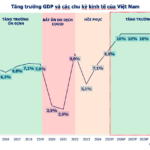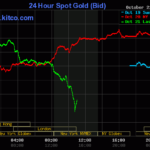Gold Prices Surge 56% in 2025
At the 2026 Business Forum themed “New Growth Spaces: Opportunities and Strategies”, hosted by BizLIVE this morning, experts highlighted gold’s resurgence as a focal point in the global financial market. However, alongside the soaring gold prices, Vietnam requires a clear policy framework to manage, transparize, and effectively leverage the nation’s gold reserves.
In his forum presentation, Mr. Huỳnh Minh Tuấn, Founder of FIDT, revealed that gold prices climbed 56% in the first ten months of 2025—the sharpest rise in nearly two decades.
He identified three key drivers: First, the U.S. Federal Reserve’s interest rate policy—slower-than-expected rate cuts drove investors toward gold as a safe-haven asset. Second, escalating global economic risks due to trade tensions and tariff policies among major economies. Third, central banks worldwide, notably China and India, significantly increased their gold purchases, pushing demand to record highs.
“Amid widespread uncertainty, gold is projected to remain a central investment focus,” Mr. Tuấn predicted.
In Vietnam, domestic gold prices fluctuated sharply due to a substantial gap with global prices, peaking at over 10%. However, ending the monopoly on gold bars and establishing a National Gold Trading Floor will mark a “turning point” in management, enhancing data transparency, controlling irregular transactions, and curbing speculation and money laundering.
“Shifting from restriction to regulation is the right approach. Once the gold exchange launches, private capital will be mobilized and legally circulated, rather than lying dormant in safes,” Mr. Tuấn stated.
Proposed Tax on Gold Transaction Income
A hotly debated topic at the forum was the taxation of gold transactions, aimed at fostering fairness and market stability.
Economist Mr. Ngô Trí Long noted that a new policy draft proposes a 0.1% tax on gold transactions valued at 20 million VND or more, conducted via bank accounts. According to Mr. Long, the Ministry of Finance and the State Bank have agreed on this tax mechanism, which must clearly differentiate between short-term speculators and long-term investors.

Assoc. Prof. Dr. Ngô Trí Long (left) speaking at the forum.
“Globally, gold transactions are taxed. A 0.1% personal income tax is reasonable, targeting speculators and aiding market stabilization,” Mr. Long emphasized.
He added that if approved by the National Assembly, this regulation will restore gold trading as a transparent financial investment activity, while curbing underground transactions, foreign exchange losses, and tax evasion.
Echoing this view, Mr. Nguyễn Quang Huy (Nguyen Trai University) argued that taxation is necessary but requires appropriate value thresholds and holding periods to avoid conflating speculation with long-term investment. “Vietnamese often buy gold for accumulation, not short-term speculation. Policies must account for this behavior to ensure fairness and avoid market distortion,” Mr. Huy said.
He believes that, if properly implemented, taxation will not only boost state revenue but also enhance market professionalism, mirroring practices in developed nations.
Mr. Huỳnh Minh Tuấn suggested that another solution for market stability lies in the 2026 launch of the National Gold Trading Floor. This will record all transactions electronically, reducing “dual pricing” and off-the-books trading.
“Standardized data will enable the government to monitor actual supply and demand, facilitating effective policy-making and mitigating price shocks,” he explained.
Experts also anticipate that the gold exchange will narrow the domestic-international price gap, a long-standing source of market instability. Additionally, it presents an opportunity to harness Vietnam’s estimated 500 to 1,000 tons of private gold as a financial resource for the economy.
Industry professionals view the elimination of gold bar monopolies, establishment of a trading floor, and transparent transaction taxation as three pillars of the new management strategy. These measures not only control but also transform gold from a “frozen” asset into a liquid one, fueling economic flows.
“I’m not concerned about rising gold prices, as they reflect citizens’ wealth and trust in a safe-haven asset. The key is channeling that trust into a resource for development,” Mr. Tuấn concluded.
Strategic Asset Allocation: Balancing Stocks, Real Estate, Gold, and Silver for Optimal Investment Returns
Economic stimulus measures are poised to fuel robust growth across key investment channels, including stocks, real estate, precious metals, and digital assets.
Gold Shop Inspections Conducted in Two Localities
In this area, the gold shop, specializing in the trade of gold bars and the craftsmanship of fine jewelry, meticulously verifies all transactions, invoices, and documentation.










































